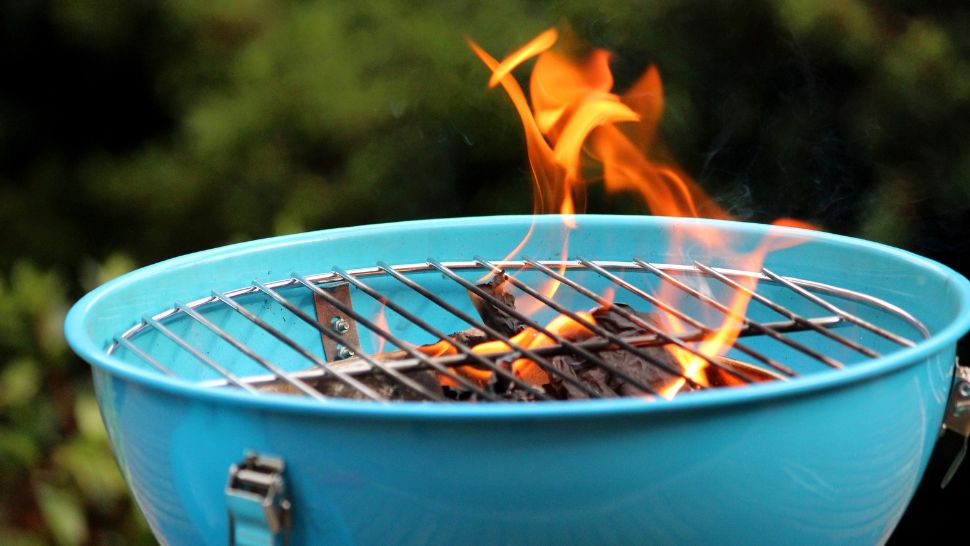
For many of us, warmer weather means firing up the grill and inviting friends over for a summer barbecue. But around this time every year, the dangers of charred and blackened foods come to light. Could it be that an activity as ancient and benign as cooking over an open flame has sinister consequences? Let’s look a little closer at those grill marks.
First, let’s clarify the difference between grilling, blackening, and barbecuing. Grilling is cooking foods at high heat over an open flame (typically gas). Blackening is coating a food with an intensely flavored spice mix that when grilled, creates a deep brown or almost black crust on the outside and slightly replicates the flavors of open-fire cooking. Barbecuing is typically cooking meats slowly over a carefully moderated charcoal fire. Sometimes people use the term “barbecue” to mean foods that are cooked over an open gas or charcoal flame.
Research has shown that high-temperature cooking methods such as grilling or barbecuing, as well as cooking meats for an extended period of time, cause proteins to change and form compounds known as heterocyclic amines (HCAs). HCAs can damage our genes in ways that may lead to cancer development. Research also shows that a separate cancer-causing compound known as polycyclic aromatic hydrocarbons (PAHs) form in the smoke and flare-ups that occur when fats and juices drip into the flames. These PAHs can bind to the outside of meat.
OK, so we know these carcinogens are being formed. Is there truly evidence that links grilling to cancer?
According to the National Cancer Institute, studies in rodents have shown that high levels of exposure to HCAs and PAHs lead to tumor development. But the extremely high doses given to rodents are drastically higher than the amount a person would consume in a normal diet. However, studying humans is harder, and determining the exact level of HCAs and PAHs that a person was exposed to from cooked meats and then creating a direct link between those foods and cancer has been limited. So, while we cannot exclude the role of the cooking method entirely, it’s likely that the type of food you choose to grill has more impact on your health than does the fact that you’re grilling it.
There is an overwhelming amount of evidence that diets high in red and processed meats increase the risk of colorectal adenoma and colorectal cancer, which is why the American Institute of Cancer Research suggests limiting consumption of red and processed meats to less than 12-18 ounces per week. In a 7-year study with 300,938 participants, 1 in every 110 people were diagnosed with stage I to IV colorectal cancer. This study found that red meat and processed meat were positively associated with colorectal cancer, while white meat was inversely associated with colorectal cancer. In addition, individuals in the highest quantile of red meat consumption were more likely to be current smokers, have a higher body mass index, be less physically active, and have lower intakes of calcium, fiber, fruits and vegetables.
Although you’ve got a green light to fire up your grill and enjoy the weather, consider these tips to enjoy the pleasures of grilling while keeping your health in mind.
- Switch up the meat. Try swapping your beef burger for a vegetable, salmon, or turkey burger and consider exchanging your steak for sustainably sourced fish.
- Add some color to the grill. Fortunately, grilling isn’t limited to just meats! Grilling fruits and vegetables not only adds a depth of flavor but will add color to your plate. And the good news, grilling these foods produces insignificant amounts of HCAs. You can grill thick vegetable slices as steaks, add them to a grill basket, or skewer them on kebabs.
- Bump up the flavor with herbs and spices. Instead of relying solely on high-heat cooking methods, use herbs, spices, and flavorful marinades to enhance the taste of grilled foods without excessive charring and burning. As an alternative, try making a blackening spice mix like the one below and roast your meat — then save the grilling for your fruits and vegetables.
Blackening Spice Mix Recipe
- 2 teaspoons salt
- 2 teaspoons dried thyme
- 1 teaspoon cayenne
- 1 teaspoon garlic powder
- 2 teaspoons oregano
- 1 teaspoon black pepper
- 1 teaspoon onion powder
- 1 teaspoon paprika
Combine all spices. Store in an airtight container for up to six months.
Need some more inspiration? Try these grilled vegetables or our grilled watermelon with lime-mint yogurt sauce!